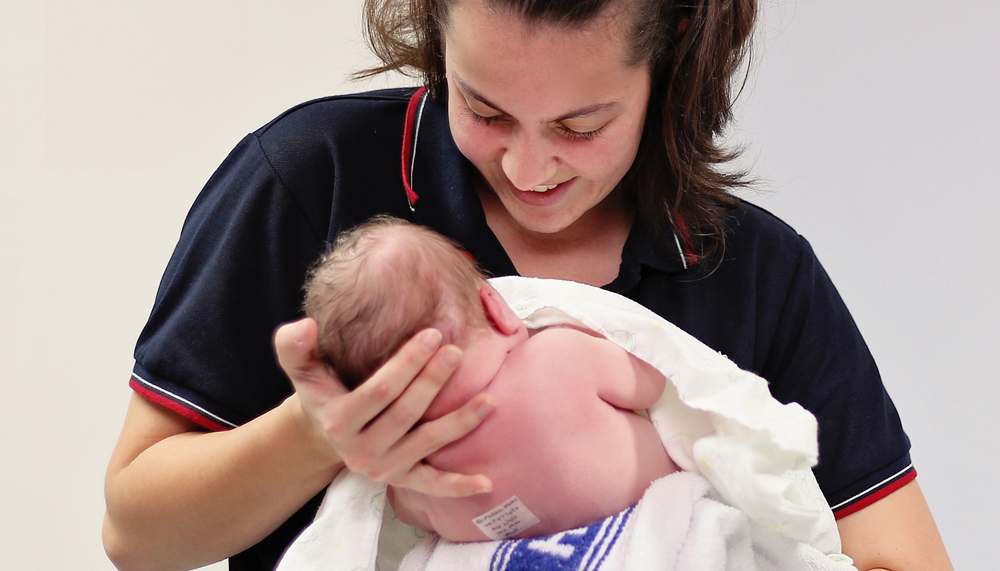Innovative program introduces students to new standard for private practice.
To date, midwifery student Kate Dousi has delivered nine babies and observed and assisted in another three births, under supervision of midwives, an experience she describes as a humbling privilege.
Dousi is amongst a cohort of 25 Griffith University students selected to spend two years working in private midwifery practices in order to gain the experience necessary to complete the bachelor of midwifery course.
The initiative – the Rural Private Midwifery Education Program (RPMEP) – is funded by Queensland Health and was originally a joint collaboration between Griffith University and private midwifery practice organisation My Midwives.
What’s special about this program is that it’s the first in Australia, and arguably the world, that supports students as they gain clinical experience in a continuity-of-care private practice model.
“This project provides an opportunity to obtain clinical education in cutting-edge models of care,” program director professor Jenny Gamble says. “It really opens up [students’] eyes to how [private practice] actually works and how feasible it actually is,” whilst also challenging nursing traditions of hospital-based or shift work.
Each student is paired with a midwife within a private practice or rural setting and gets to follow a pregnant woman and her family through the antenatal and postnatal processes.
Since students regularly have to be on call, they are provided with an education allowance through My Midwives. This arrangement does have students working all sorts of odd and hours; however, this doesn’t seem to faze Dousi.
“As students, we strive to go above and beyond in order to be with the woman and her support person during labour and birth,” she says. “I know I speak for many students when I say that numerous sacrifices are made in order to provide quality continuity of midwifery care, but it’s certainly worth it.”
Additional opportunities afforded these students include attending home births, making home visits and providing continuity of care with a known midwife.
Dousi says working with a dedicated midwife provides an open forum for questions, and allows any concerns to be expressed freely and openly in a non-judgemental environment.
“I recently attended hospital shifts, which I thoroughly enjoyed; however, I feel that there is a relaxed and comforting atmosphere at a birth when everyone is familiar with each other and is confident in their abilities.”
Dousi, who works as part of the Toowoomba-based My Midwives team, is joined in the program by fellow student Lucinda Boardman – who is based in Bundaberg.
Boardman, who was facing being left without a grad position, says when the opportunity to be involved in the program originally arose she was hesitant, but after reading more of what it involved she realised how good it sounded.
Having just completed the first six months, she says the experience is exceptional and describes the education provided as “far more conducive to the midwifery students’ learning needs”.
“Just as continuity for a woman receiving maternity care supports therapeutic relations and enhances her maternity experience, so too does continuity for a student,” Boardman says. “This continuity means that I see women right across the maternity care continuum, rather than in a hospital where I would be restricted to antenatal, birth suites, special care, etc.”
My Midwives managing director and long-time midwifery advocate Liz Wilkes says she is yet to find anything similar to the progam worldwide.
Wilkes, based in Toowoomba, has been working with five students – including Dousi – and says it’s been fantastic.
“Having the students linked in has made life so much easier,” Wilkes says. “It means that we are able to provide more care for more women. And it’s better care because you have got more people to provide it, [even if it is] just a student sitting and talking with a sad mum. It just means you have more hands on deck.”
The RMPEP highlights the growing support and need for midwives working within continuity-of-care models, which have been shown to reduce cost and stress to women and improve outcomes for babies.
Gamble says Australian women have limited access to midwives and to continuity of care by a known midwife and that maternity services need to be reoriented to provide this model of care to all women.
Boardman agrees, suggesting that this type of education will open up more options for women, allowing them to move away from clinicalised birth and focusing more on the emotional, spiritual, social, psychosocial effects of birth.
“Currently we cater for the physical aspects of birth but forget that there are many other aspects to maternity care,” she says. “We need to focus on the journey as opposed to the destination.”
In December, Queensland Health announced funding for a further 25 students to go through a similar program, focusing on rural practice this time, as opposed to continuity of care. Central Queensland University will be able to offer the program.
Beyond that, there are no plans for future cohorts at this stage. Gamble confirms the next step will be to generate funds so newly graduated midwives can work in these models of care, using mentorships, scholarships and practice incentives similar to those in other health professions.
Photo information: Kate Dousi
Photo credit: Hailey Sherrie Photography
Photo information: Image taken at her first waterbirth at Toowoomba Base Hospital on the 6th of September 2013
Email [email protected]
 Aged Care Insite Australia's number one aged care news source
Aged Care Insite Australia's number one aged care news source

